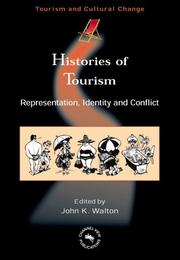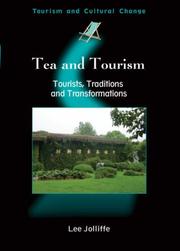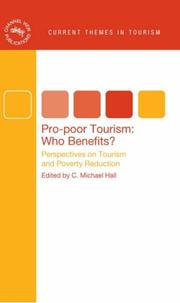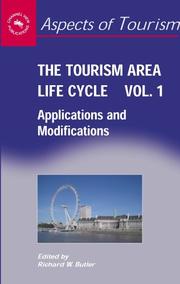| Listing 1 - 10 of 10 |
Sort by
|
Book
ISBN: 1845411927 1282656929 9786612656927 1845411447 9781845411442 9781282656925 9781845411435 1845411439 9781845411428 1845411420 9781845411923 Year: 2010 Publisher: Bristol ; Buffalo : Channel View Publications,
Abstract | Keywords | Export | Availability | Bookmark
 Loading...
Loading...Choose an application
- Reference Manager
- EndNote
- RefWorks (Direct export to RefWorks)
This book explores the various aspects of coffee culture around the globe, relating the rich history of this beverage and the surroundings where it is produced and consumed to coffee destination development and to the visitor experience. Coffee and tourism venues explored range from the café districts of Australia, Canada, Germany and New Zealand to the traditional and touristic coffee houses of Malaysia and Cyprus to coffee-producing destinations in Africa, Asia, Latin America and the Pacific. This is a must-read for those interested in understanding coffee in relation to hospitality and tourism. Readers should gain a new appreciation of the potential for coffee-related tourism to contribute to both destination development and pro-poor tourism objectives.
Coffee --- Coffee industry --- Culture and tourism. --- Heritage tourism. --- Social aspects. --- Economic aspects. --- cafe culture. --- coffee culture. --- coffee. --- cultural change. --- destination development. --- pro-poor tourism. --- visitor experience.

ISBN: 9781845410322 9781845410315 9781845410339 1845410319 1845410327 1845410335 1280550945 9786610550944 9781845412784 1845412788 Year: 2005 Volume: 6 Publisher: Clevedon Channel View Publications
Abstract | Keywords | Export | Availability | Bookmark
 Loading...
Loading...Choose an application
- Reference Manager
- EndNote
- RefWorks (Direct export to RefWorks)
This collection of essays develops the historical dimension to tourism studies through thematic case studies. The editor's introduction argues for the importance of a closer relationship between history and tourism studies, and an international team of contributors explores the relationships between tourism, representations, environments and identities in settings ranging from the global to the local, from the Roman Empire to the twentieth century, and from Frinton to the 'Far East'.
Tourism --- History of civilization --- World history --- Tourisme --- History --- Histoire --- 379.85 --- toerisme --- geschiedenis --- Groot-Brittannië --- Japan --- Duitsland --- Derde Rijk --- Oostenrijk --- Spanje --- toerisme - algemeen --- Tourism - History. --- Geography --- Earth & Environmental Sciences --- Travel & Tourism --- conflict. --- destination development. --- history. --- identity. --- representation. --- tourism. --- tourist experience.
Book
ISBN: 1845414454 1845414446 9781845414443 1306902339 9781306902335 9781845414436 9781845414429 184541442X 1845414438 9781845414450 Year: 2014 Publisher: Bristol, UK; Blue Ridge Summit, PA : Channel View Publications,
Abstract | Keywords | Export | Availability | Bookmark
 Loading...
Loading...Choose an application
- Reference Manager
- EndNote
- RefWorks (Direct export to RefWorks)
This is the first book to explore the relationship between tourism and spices. It examines the various layers of connection between spices and tourism in terms of destinations, attractions and cuisines. The book reveals how spice-producing destinations are employing spices in destination branding and encouraging spice farms to move towards tourism, while destinations not producing spices are employing spices and herbs in distinctive local cuisines. Both tangible and intangible spice heritages are highlighted as tools for developing destinations, creating attractions, inventing new forms of livelihoods and distinguishing local, regional and national cuisines. This volume will be useful for researchers and students in cultural tourism, culinary tourism, anthropology of food and food history.
Spices --- Spice trade --- Culture and tourism --- Heritage tourism --- Ethnotourism --- Tourism and culture --- Tourism --- Spice industry --- Plant products industry --- Condiments --- Cultural tourism --- Social aspects --- History --- destination development. --- heritage. --- national cuisines. --- spice farms. --- spices. --- tourism attractions. --- tourism.


ISBN: 9781845410568 9781845410575 9781845410582 1845410564 1845410572 1845410580 128073924X 9786610739240 1845413245 Year: 2007 Volume: 11 Publisher: Bristol, UK Blue Ridge Summit, PA
Abstract | Keywords | Export | Availability | Bookmark
 Loading...
Loading...Choose an application
- Reference Manager
- EndNote
- RefWorks (Direct export to RefWorks)
The global production, marketing and consumption of tea present a resource for tea-related tourism. Tea and Tourism: Tourists, Traditions and Transformations profiles tea cultures and examines the social, political and developmental contexts of using related traditions for touristic purposes. This volume views tourism related to tea from differing disciplinary perspectives, and from marketing, planning, entrepreneurial and developmental viewpoints. The book examines the transformation of indigenous and imported tea traditions into experiences for tourists. Profiling these tea experiences from around the world including the United Kingdom; Sri Lanka; India; China; Taiwan; Kenya and Canada the volume reveals the ways in which tea’s heritage is adapted for tourism consumption. This is the first definitive work on tea tourism. Global tea tourism trends are identified, while case examples provide fresh perspectives on the ongoing transformation of tea for tourism purposes.
Tea --- Tea trade --- Culture and tourism --- Heritage tourism --- Thé --- Ethnotourisme --- Tourisme culturel --- Social aspects --- Aspect social --- Commerce --- Culture and tourism. --- Culture and tourism - Case studies. --- Heritage tourism. --- Tea. --- Tea trade. --- Manners & Customs --- Anthropology --- Social Sciences --- Thé --- Ethnotourism --- Tourism and culture --- Tea industry --- Camellia sinensis --- Camellia thea --- Camellia theifera --- Cultural tourism --- Tourism --- Beverage industry --- Camellias --- destination development. --- heritage. --- marketing. --- planning. --- tea cultures. --- tea traditions. --- tourism.
Book
ISBN: 9781845411664 1845411668 9781845411671 1845411676 9781845411688 1845411684 1283147467 9786613147462 9781845412098 1845412095 Year: 2011 Publisher: Bristol, UK : Channel View Publications,
Abstract | Keywords | Export | Availability | Bookmark
 Loading...
Loading...Choose an application
- Reference Manager
- EndNote
- RefWorks (Direct export to RefWorks)
Festivals have burgeoned in rural areas, revitalising old traditions and inventing new reasons to celebrate. How do festivals contribute to tourism, community and a rural sense of belonging? What are their cultural, environmental and economic dimensions? This book answers such questions - featuring contributions from leading geographers, historians, anthropologists, tourism scholars and cultural researchers. It draws on a range of case studies: from the rustic charm of agricultural shows and family circuses to the effervescent festival of Elvis Presley impersonators in Parkes; from wildflower collecting to the cosmopolitan beats of ChillOut, Australia's largest non-metropolitan gay and lesbian festival. Festivals as diverse as youth surfing carnivals, country music musters, Aboriginal gatherings in the remote Australian outback, Scottish highland games and German Christmas celebrations are united in their emphasis on community, conviviality and fun. -- Chris Gibson is Professor in Human Geography at the University of Wollongong. John Connell is Professor of Geography at the University of Sydney. For well over a decade they have been researching and writing about music, tourism and festivals in Australia and beyond. More recently they were part of a team undertaking Australia's largest ever study of rural festivals, with 480 festivals participating in the research. Insights from that research project feature throughout this book. --Book Jacket.
Festivals --- Country life --- Fêtes --- Vie rurale --- Australia --- Australie --- Social life and customs. --- Moeurs et coutumes --- Australia -- Social life and customs. --- Country life -- Australia. --- Festivals -- Australia -- Case studies. --- Festivals -- Australia. --- Anthropology --- Social Sciences --- Manners & Customs --- Fêtes --- Days --- Manners and customs --- Anniversaries --- Fasts and feasts --- Pageants --- Processions --- belonging. --- community. --- destination development. --- festivals. --- identity. --- marketing. --- rural Australia.
Book
ISBN: 1845415647 9781845415648 9781845415624 9781845415631 9781845415655 9781845415662 1845415655 1845415620 1845415639 Year: 2016 Publisher: Bristol : Channel View Publications,
Abstract | Keywords | Export | Availability | Bookmark
 Loading...
Loading...Choose an application
- Reference Manager
- EndNote
- RefWorks (Direct export to RefWorks)
This volume provides the first comprehensive examination of travel guidebooks and their conceptualisation, use and impact. Guidebooks have been key tourism paraphernalia for almost two centuries and although researched in some areas, academic knowledge on guidebooks in tourism has not been expansively communicated. The uncritical, unreflective and largely pejorative approach to guidebooks in the public sphere, and to some degree also present in academia, is reassessed in this book. This challenges the current limited tourism research approaches to the topic, including the routinely held assumption that the internet has all but destroyed the printed guidebook. This book will be a useful resource for postgraduate students and researchers in tourism and tourism communications and consumption.
Travel --- Tourism. --- Holiday industry --- Operators, Tour (Industry) --- Tour operators (Industry) --- Tourism --- Tourism industry --- Tourism operators (Industry) --- Tourist industry --- Tourist trade --- Tourist traffic --- Travel industry --- Visitor industry --- Voyages and travels --- Economic aspects --- Service industries --- National tourism organizations --- E-books --- Voyages --- Tourisme --- Guidebooks. --- Guides --- Guidebook conceptualisation. --- Guidebook history. --- Guidebook research critique. --- Guidebook use. --- Guidebooks and destination development. --- Travel guidebook.


ISBN: 1845410750 9786610934973 1280934972 1845410769 9781845410766 9781845410759 9781280934971 6610934975 Year: 2007 Publisher: Bristol, UK Blue Ridge Summit, PA
Abstract | Keywords | Export | Availability | Bookmark
 Loading...
Loading...Choose an application
- Reference Manager
- EndNote
- RefWorks (Direct export to RefWorks)
Pro-poor tourism – tourism that is intended to result in increased net benefits for poor people – is currently receiving enormous attention from the World Tourism Organization, the UN system, governments, industry, and NGOs and is an integral component of many sustainable development strategies in the less developed countries. Through a series of cases and reviews from experts in the field this book provides one of the first assessments of the effectiveness of pro-poor tourism as a development strategy and tackles the issue of who benefits from tourism’s potential role in poverty reduction. This timely book therefore makes a major contribution to the ongoing debate about tourism’s role in economic development, postcolonial politics, and North-South relations at a time when international trade negotiations appear poised to further open up developing countries to international tourism.
Poverty. --- Tourism. --- Tourism --- Poverty --- Geography --- Earth & Environmental Sciences --- Travel & Tourism --- Destitution --- Holiday industry --- Operators, Tour (Industry) --- Tour operators (Industry) --- Tourism industry --- Tourism operators (Industry) --- Tourist industry --- Tourist trade --- Tourist traffic --- Travel industry --- Visitor industry --- Economic aspects --- Wealth --- Basic needs --- Begging --- Poor --- Subsistence economy --- Service industries --- National tourism organizations --- Travel --- North-South relations. --- destination development. --- economic development. --- postcolonial politics. --- poverty alleviation. --- pro-poor tourism. --- sustainable development.
Book
ISBN: 1845414748 9781845414740 1322294089 9781322294087 9781845414757 9781845414733 184541473X 9781845414726 1845414721 1845414756 Year: 2015 Publisher: Bristol ; Buffalo : Channel View Pulications,
Abstract | Keywords | Export | Availability | Bookmark
 Loading...
Loading...Choose an application
- Reference Manager
- EndNote
- RefWorks (Direct export to RefWorks)
This book explores and challenges the relationship between tourism and development and establishes a conceptual link between the discrete yet interconnected disciplines of tourism studies and development studies. This revised and expanded second edition provides not only a comprehensive theoretical foundation in development studies but also a critical analysis of contemporary themes and issues relevant to the study of tourism and its potential contribution to development. The second edition contains new chapters on the following topics: - Tourism and Poverty Reduction - Cultural Heritage, Tourism and Socio-economic Development - Tourism, Climate Change and Development - Human Rights Issues in Tourism Development - Tourism, Development and International Studies
Economic development. --- Tourism. --- Tourism --- Economic development --- Development, Economic --- Economic growth --- Growth, Economic --- Economic policy --- Economics --- Statics and dynamics (Social sciences) --- Development economics --- Resource curse --- Holiday industry --- Operators, Tour (Industry) --- Tour operators (Industry) --- Tourism industry --- Tourism operators (Industry) --- Tourist industry --- Tourist trade --- Tourist traffic --- Travel industry --- Visitor industry --- Service industries --- National tourism organizations --- Travel --- Economic aspects --- destination development. --- development studies. --- development theory. --- economic development. --- evolution of tourism. --- regional development. --- sociocultural development. --- socioeconomic development. --- tourism development. --- tourism industry. --- tourism-induced development.


ISBN: 9781845410254 9781845410261 1845410297 1845410289 1845410270 1845410300 1845410262 1845410254 9786610501700 1280501707 9786610501717 1280501715 9781845410292 9781845410308 9781845410308 9781280501708 661050170X 9781845410278 9781845410278 9781280501715 6610501718 Year: 2006 Volume: 28 Publisher: Bristol, UK Blue Ridge Summit, PA
Abstract | Keywords | Export | Availability | Bookmark
 Loading...
Loading...Choose an application
- Reference Manager
- EndNote
- RefWorks (Direct export to RefWorks)
This volume consists of specially invited chapters by leading researchers who have reviewed the original model in the light of their own and other conceptual and theoretical positions and models. The book is divided into five sections, the conceptual origins of the TALC, spatial relationships and the TALC, alternative conceptual approaches, renewing or retiring with the TALC, and predicting with the TALC. The book concludes with a review of the future potential of the model in the area of the destination development process.
Tourism --- Economic development. --- Tourisme --- Développement économique --- Economic aspects. --- Aspect économique --- Tourism. --- Tourism - Economic aspects. --- Economic development --- Travel & Tourism --- Geography --- Earth & Environmental Sciences --- Développement économique --- Aspect économique --- Holiday industry --- Operators, Tour (Industry) --- Tour operators (Industry) --- Tourism industry --- Tourism operators (Industry) --- Tourist industry --- Tourist trade --- Tourist traffic --- Travel industry --- Visitor industry --- Development, Economic --- Economic growth --- Growth, Economic --- Economic aspects --- Service industries --- National tourism organizations --- Travel --- Economic policy --- Economics --- Statics and dynamics (Social sciences) --- Development economics --- Resource curse --- TALC in heritage settings. --- TALC. --- evolution of tourism areas. --- tourism area life cycle. --- tourism development. --- tourism rejuvenation. --- tourist destinations. --- Richard Butler. --- destination development process. --- entrepreneurship theory.
Book
ISBN: 3039217739 3039217720 Year: 2019 Publisher: MDPI - Multidisciplinary Digital Publishing Institute
Abstract | Keywords | Export | Availability | Bookmark
 Loading...
Loading...Choose an application
- Reference Manager
- EndNote
- RefWorks (Direct export to RefWorks)
Within the framework of tourism companies and tourist destinations, the question of sustainability is gaining importance. Tourists are increasingly aware of the importance of sustainability criteria, awarding greater value to sustainable destinations. Sustainability refers to a wide range of aspects related to climate change, the economic organization of tourism, social values or questions, job creation, and the necessary protection of the culture of destinations and the environment. Therefore, there is a need for studies that consider these aspects in order to achieve the sustainable development of tourist destinations. Fundamental to this is discovering to what degree tourism companies and destinations approach these questions in the strategies they use to deal with problems stemming from their attempts to be more sustainable. Conceptual papers and empirical research on the economic, social, cultural, and environmental aspects related to tourism companies and destinations are welcome. Studies that analyze how these questions and the concept of sustainability are included in tourism companies and destinations are necessary in these modern times. This book was established for these reasons, dedicated to examining sustainability in tourism. The papers included in this Special Issue can help us to determine the new directions being addressed in the research on sustainability tourism.
the “health” of rural settlements --- sport tourism --- physical environment (PhE) --- tourism evaluation --- hotel industry --- internet search index --- deep learning framework --- visitor satisfaction --- discrete choice experiments --- invasive species control --- tourist satisfaction --- all-for-one tourism --- spatial analysis --- choice experiment --- two stage on-site sampling --- tourism and sustainability --- Apuseni mountains --- sporting event --- sustainability services marketing matrix --- compartmentalisation --- climate change --- regression discontinuity design --- supply chain --- TOWS matrix --- essential marketing --- LSTM model --- A’WOT --- time series --- museum planning --- sustainable daily practices --- negative externalities --- event quality --- sustainability --- certification --- sustainable development --- islands --- young adults --- semantic analysis --- sense of belonging --- agritourism --- behavioral intentions --- purchasing --- motivation --- pro-social/pro-environmental behavior --- tourism --- ecolabel adoption --- hotel accommodation demands --- tourism indicators --- local community --- destination development --- forecasting performance --- inbound tourism --- China --- visitor behavior --- cluster analysis --- campsites --- science museum --- qualitative methodology --- place attachment --- forecasting --- mountain areas --- ecolabel --- electricity --- tourists’ preferences --- value and tourism --- sustainable tourism --- strategic planning --- regional disparity --- community-based tourism --- forecast through a logistic model --- PM10 --- constraint --- air pollution --- learning-based tourism --- hotel management --- ICT
| Listing 1 - 10 of 10 |
Sort by
|

 Search
Search Feedback
Feedback About UniCat
About UniCat  Help
Help News
News